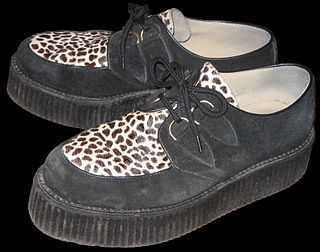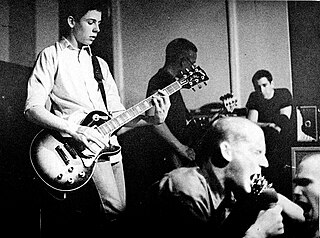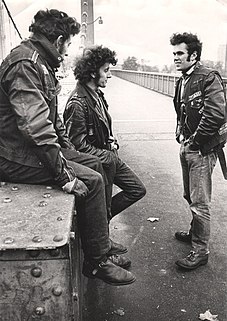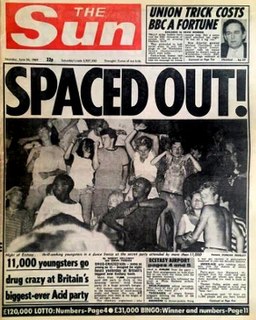 W
WThe 59 Club, also written as The Fifty Nine Club and known as 'the 9', is a British motorcycle club with members distributed internationally.
 W
W78-87 London Youth is a 2012 photography book by British photographer Derek Ridgers.
 W
WThe Ace Cafe is an old transport cafe located near Wembley, North West London, England. Situated next to the North Circular Road, it is historically a notable venue in motorcycle culture. The original cafe opened in 1938 and closed in 1969. It re-opened on the original site in 1997 as a cafe, functions, and entertainment venue.
 W
WAckley Bridge is a British comedy-drama series set in a multicultural academy school of the same name. The series began broadcasting on Channel 4 on 7 June 2017. Following the conclusion of the first series, a second series was announced, which was first broadcast in 2018. After a third series consisting of eight episodes was broadcast in 2019, Ackley Bridge was renewed for a fourth series. While the fourth series was originally set to air in September 2020, filming was postponed due to the COVID-19 pandemic, meaning the series premiered in April 2021. The fourth series saw an overhaul, including an earlier timeslot, shortened runtime, and several new cast members. In June 2021, production on the fifth series of Ackley Bridge commenced.
 W
WThe Blitz Kids were a group of people who frequented the Tuesday club-night at Blitz in Covent Garden, London in 1979-80, and are credited with launching the New Romantic subcultural movement. Steve Strange and Rusty Egan co-hosted these exclusive nights without giving them a name, according to Strange's autobiography, and publicised them solely by word of mouth. An emphasis on style was ensured by enforcing a strict dress code at the door. Crucially, the Blitz lay between two art colleges and it became a testbed for student fashion designers who set London ablaze during the 1980s. These included Stephen Jones, Kim Bowen, Fiona Dealey, Stephen Linard, David Holah, Stevie Stewart, John Galliano, Darla Jane Gilroy and more. The Blitz began making headlines thanks to its outrageous styles of clothes and make-up for both sexes, subsequently documented by Gary Kemp in his 2009 first-person book, I Know This Much, and by Graham Smith and Chris Sullivan in their 2011 book We Can Be Heroes: London Clubland 1976-1984.
 W
WBoy racer is a term given to a young person who drives in a fast and aggressive manner; it has become a broader term for participants in modern custom car culture who tune and modify cars with street racing-style aftermarket cosmetic and performance parts such as body kits, audio systems and exhausts. The culture encompasses a broad range of car types including sport compacts and economy cars typical of the import scene, this is in contrast with the hot rod culture of previous generations. Some car enthusiasts and modifiers feel the term labels them as deviant and anti-social and are keen to distance themselves from the term. Boy racer is a term mostly but not exclusively associated with the UK, in Australia and New Zealand hoon is sometimes preferred. In the US, "Rice boy" or "Ricer" is a derogatory term for the driver or builder of an imported hot rod, or someone who modifies their car in a cheap way to imitate the look of a higher performance vehicle.
 W
WBrighton Rock is a 2010 British crime film written and directed by Rowan Joffé and loosely based on Graham Greene's 1938 novel of the same name. The film stars Sam Riley, Andrea Riseborough, Andy Serkis, John Hurt, Sean Harris and Helen Mirren.
 W
WCool Britannia was a name for the period of increased pride in the culture of the United Kingdom throughout the mid and second half of the 1990s, inspired by Swinging London from 1960s pop culture. This loosely coincided with John Major's conservative government and the 1997 United Kingdom general election where Tony Blair's New Labour government won in a landslide. The success of Britpop and musical acts such as the Spice Girls, Blur and Oasis led to a renewed feeling of optimism in the United Kingdom following the tumultuous years of the 1970s and 1980s. The name is a pun on the title of the British patriotic song "Rule, Britannia!"
 W
WBrothel creepers, sometimes shortened to creepers, are a style of shoe that has thick crepe soles, often in combination with suede uppers. This style of footwear became fashionable in the years following World War II, seeing resurgences of popularity at various times since then.
 W
WIn English slang, a Croydon facelift is a particular hairstyle worn by some women. The hair is pulled back tightly and tied in a bun or ponytail at the back. The supposed result is that the skin of the forehead and face are pulled up and back, producing the effects of a facelift.
 W
WA cutdown is a customised scooter with parts of the bodywork removed or cut away. Cutdowns were popular amongst skinheads and scooterboys during the mod revival of the 1970s and 1980s. While the style-obsessed British mod youth subculture of the 1960s prized the glamorous, metropolitan image of scooters, many skinheads and scooterboys viewed their bikes as simply a form of transportation.
 W
WDAKS is a British luxury fashion house, founded in 1894 by Simeon Simpson in London. The name is a combination of the initials of Alexander Simpson and an initial and final letter of his business associate Dudley Beck.
 W
WEssex girl, as a pejorative stereotype in the United Kingdom, applies to a woman viewed as promiscuous and unintelligent, characteristics jocularly attributed to women from Essex. It is applied widely throughout the country and has gained popularity over time, dating from the 1980s and 1990s.
 W
WEverywhere and Nowhere is a 2011 coming of age British drama film focusing on the identity struggles of Ash a young British Pakistani who is torn between the traditions of middle-class family life and his passion for DJing. The film comes from Kidulthood director Menhaj Huda.
 W
WFree Rein is a British drama television series created and written by Vicki Lutas and Anna McCleery. It stars Jaylen Barron, Navia Robinson and Freddy Carter. Produced in the UK by Lime Pictures, the ten-part first series premiered on Netflix on 23 June 2017. Although the island where the series is set is fictional and unnamed, it is based on Anglesey, Wales and is referred to as "an island off the coast of England" throughout the programme. The second series premiered on 6 July 2018. Shortly afterwards, Free Rein was renewed for a third series, as well as two feature-length special episodes. Free Rein: The 12 Neighs of Christmas, premiered on 7 December 2018. The second special, Free Rein: Valentine’s Day, premiered on 1 February 2019. The third series, consisting of 10 episodes, premiered on 6 July 2019. In January 2021, cast member Céline Buckens confirmed that the series had concluded.
 W
WGeneration X is a 1964 192-page book on popular youth culture by British journalists Jane Deverson and Charles Hamblett. It contains interviews with teenagers who were part of the Mod subculture. It began as a series of interviews in a 1964 study of British youth, commissioned by British lifestyle magazine Woman's Own where Deverson worked. The interviews detailed a culture of promiscuous and anti-establishment youth, and was seen as inappropriate for the magazine.
 W
WA Glasgow smile is a wound caused by making a cut from the corners of a victim's mouth up to the ears, leaving a scar in the shape of a smile.
 W
WHardcore punk is a punk rock music genre and subculture that originated in the late 1970s. It is generally faster, harder, and more aggressive than other forms of punk rock. Its roots can be traced to earlier punk scenes in San Francisco and Southern California which arose as a reaction against the still predominant hippie cultural climate of the time. It was also inspired by New York punk rock and early proto-punk. Hardcore punk generally disavows commercialism, the established music industry and "anything similar to the characteristics of mainstream rock" and often addresses social and political topics with "confrontational, politically-charged lyrics."
 W
WHardcore punk in the United Kingdom began in the late 1970s and early 1980s with the second wave of punk rock in the country. The scene produced many successful and influential hardcore punk bands throughout the 1980s such as Discharge, GBH and the Exploited and led to the pioneering of genres such as grindcore, street punk, crust punk and D-beat.
 W
WHeavy metal fashion is the style of dress, body modification, make-up, hairstyle, and so on, taken on by fans of heavy metal, or, as they are often called, metalheads or headbangers. While the style has changed from the 1970s to the 2020s, certain key elements have remained constant, such as black clothes, long hair and leather jackets. In the 1980s, some bands began wearing spandex. Other attire includes denim or leather vests or jackets with band patches and logos, t-shirts with band names, and spiked wristbands.
 W
WFans of heavy metal music have created their own subculture that encompasses more than just appreciation of the style of music. Fans affirm their membership in the subculture or scene by attending metal concerts, buying albums, growing their hair long in most to (almost) all cases, wearing jackets or vests often made of denim and adorned with band patches and often studs, and since the early 1980s, by contributing to metal publications.
 W
WIn My Skin is a British comedy drama television series that premiered on BBC Three on 14 October 2018. The series was initially ordered as a short film for BBC Wales, but this later acted as the pilot episode after BBC ordered In My Skin as a full series. The series stars Gabrielle Creevy, James Wilbraham, Poppy Lee Friar, Jo Hartley, Aled ap Steffan, Di Botcher, Zadeiah Campbell-Davies, Georgia Furlong and Rhodri Meilir. The series has received critical acclaim, as well as numerous awards from ceremonies including BAFTA Cymru and the RTS Programme Awards. In March 2021, In My Skin was renewed for a second and final series, set to air later in the year.
 W
WKing's Road or Kings Road, is a major street stretching through Chelsea and Fulham, both in west London. It is associated with 1960s style and with fashion figures such as Mary Quant and Vivienne Westwood. Sir Oswald Mosley's Blackshirt movement had a barracks on the street in the 1930s.
 W
WMisfits is a British science fiction comedy-drama television show, on E4, about a group of young offenders sentenced to work in a community service programme, where they obtain supernatural powers after a strange electrical storm. The show premiered on 12 November 2009 and concluded on 11 December 2013 in its fifth season.
 W
WMod is a subculture that began in London and spread throughout Great Britain and elsewhere, eventually influencing fashions and trends in other countries, and continues today on a smaller scale. Focused on music and fashion, the subculture has its roots in a small group of stylish London-based young men in the late 1950s who were termed modernists because they listened to modern jazz. Elements of the mod subculture include fashion ; music ; and motor scooters. In the mid-1960s, the subculture listened to power pop rock groups with mod following, such as The Who and The Small Faces, after the peak Mod era. The original mod scene was associated with amphetamine-fuelled all-night dancing at clubs.
 W
WMods and rockers were two conflicting British youth subcultures of the early/mid 1960s to early 1970s. Media coverage of mods and rockers fighting in 1964 sparked a moral panic about British youth, and the two groups became widely perceived as violent, unruly troublemakers.
 W
WThe New Romantic movement was a pop culture movement that originated in the United Kingdom in the late 1970s. The movement emerged from the nightclub scene in London and Birmingham at venues such as Billy's and The Blitz. The New Romantic movement was characterised by flamboyant, eccentric fashion inspired by fashion boutiques such as Kahn and Bell in Birmingham and PX in London. Early adherents of the movement were often referred to by the press by such names as Blitz Kids, New Dandies and Romantic Rebels.
 W
WPunk ideologies are a group of varied social and political beliefs associated with the punk subculture and punk rock. It is primarily concerned with concepts such as mutual aid, against selling out, egalitarianism, humanitarianism, anti-authoritarianism, anti-consumerism, anti-corporatism, anti-war, decolonization, anti-conservatism, anti-globalization, anti-gentrification, anti-racism, anti-sexism, gender equality, racial equality, health rights, civil rights, animal rights, disability rights, free-thought and non-conformity. One of its main tenets is a rejection of mainstream, corporate mass culture and its values. It continues to evolve its ideology as the movement spreads throughout North America from its origins in England and New York and embraces a range of anti-racist and anti-sexist belief systems. Punk ideologies are often Leftist / Anti-capitalist and go against authoritarian and the Right-wing Christian ideologies.
 W
WThe punk subculture includes a diverse and widely known array of ideologies, fashion, and other forms of expression, visual art, dance, literature and film. It is largely characterised by anti-establishment views, the promotion of individual freedom, DIY ethics, and is centred on a loud, aggressive genre of rock music called punk rock.
 W
WRockers, leather boys, Ton-up boys, and possibly café racers are members of a biker subculture that originated in the United Kingdom during the 1950s. It was mainly centred on British café racer motorcycles and rock 'n' roll music. By 1965, the term greaser had also been introduced to the UK and, since then, the terms greaser and rocker have become synonymous within the British Isles although used differently in North America and elsewhere. Rockers were also derisively known as Coffee Bar Cowboys. Their Japanese counterpart was called the Kaminari-Zoku.
 W
WThe scene subculture is a youth subculture that emerged during the early 2000s in the United States from the pre-existing emo subculture. The subculture became popular with adolescents from the mid-2000s to early 2010s. Members of the scene subculture are referred to as scene kids, trendies, or scenesters. Scene fashion consists of skinny jeans, bright colored clothing, a signature hairstyle consisting of straight, flat hair with long fringes covering their forehead, and bright colored hair dye. Music genres associated with the scene subculture include metalcore, crunkcore, deathcore, electronic music, and pop punk.
 W
WA scooterboy is a member of one of several scooter-related subcultures of the 1960s and later decades, alongside rude boys, mods and skinheads. The term is sometimes used as a catch-all designation for any scootering enthusiast who does not fall into the latter three categories.
 W
WThe Second Summer of Love was a 1980s social phenomenon in the United Kingdom which saw the rise of acid house music and unlicensed rave parties. Although primarily referring to the summer of 1988, it lasted into the summer of 1989, when electronic dance music and the prevalence of the drug MDMA fuelled an explosion in youth culture culminating in mass free parties and the era of the rave. The music of this era fused dance beats with a psychedelic, 1960s flavour, and the dance culture drew parallels with the hedonism and freedom of the 1967 Summer of Love in San Francisco. The smiley logo is synonymous with this period in the UK.
 W
WShameless is a British comedy drama television series set in Manchester on the fictional Chatsworth council estate, created and partially written by Paul Abbott, who is also the programme's executive producer. Produced by Company Pictures for Channel 4, the programme ran for eleven series and aired from 13 January 2004 to 28 May 2013. The show, centred on British working-class culture, was accorded critical acclaim by the British media, including the newspaper The Sun and Newsnight Review on BBC Two. In 2005, the show won Best Drama Series at the BAFTA TV Awards and Best TV Comedy Drama at the British Comedy Awards. The network Showtime created an American version of the series, which debuted in 2011.
 W
WSkins is a British teen comedy-drama television series that follows the lives of a group of teenagers in Bristol, South West England, through the two years of sixth form. Its controversial story-lines have explored issues like dysfunctional families, mental illness, adolescent sexuality, gender, substance abuse, death, and bullying.
 W
WStanley Park is one of a collection of drama pilot episodes produced for BBC Three and was broadcast on 10 June 2010. The story focuses on a group of young friends going through a life-changing period of their lives. The episode was produced by 6 Degree Media and was written by Leo Richardson and inspired by his stage play.
 W
WStorm Damage is a 2000 British television drama film directed by Simon Cellan Jones, written by Lennie James, and stars Adrian Lester, Mona Hammond and Kate Ashfield. The film is about a young teacher who returns to the children's care home where he grew up, and becomes involved with the lives of the troubled teenage children. It was broadcast by BBC Two on 23 January 2000.
 W
WThe Swinging Sixties was a youth-driven cultural revolution that took place in the United Kingdom during the mid-to-late 1960s, emphasising modernity and fun-loving hedonism, with Swinging London as its centre. It saw a flourishing in art, music and fashion, and was symbolised by the city's "pop and fashion exports". Among its key elements were the Beatles, as leaders of the British Invasion of musical acts; Mary Quant's miniskirt; popular fashion models such as Twiggy and Jean Shrimpton; the mod subculture; the iconic status of popular shopping areas such as London's King's Road, Kensington and Carnaby Street; the political activism of the anti-nuclear movement; and sexual liberation. Music was a big part of the scene, with "the London sound" including the Who, the Kinks, the Small Faces and the Rolling Stones, bands that were the mainstay of pirate radio stations like Radio Caroline and Swinging Radio England. Swinging London also reached British cinema, which, according to the British Film Institute, "saw a surge in formal experimentation, freedom of expression, colour, and comedy". During this period, "creative types of all kinds gravitated to the capital, from artists and writers to magazine publishers, photographers, advertisers, film-makers and product designers".
 W
WThe Teddy Boys or Teds were a mainly British youth subculture who were interested in rock and roll and R&B music, wearing clothes partly inspired by the styles worn by dandies in the Edwardian period, which Savile Row tailors had attempted to re-introduce in Britain after the Second World War.
 W
WTop Boy is a British television crime drama series. Created and written by Ronan Bennett, the series is set on the fictional Summerhouse estate in the London Borough of Hackney.
 W
WThe Underage Festival was a music festival in Victoria Park, London that was open only to those between 13 and 17.
 W
WWaterloo Road is a British television drama series set in a comprehensive school of the same name, first broadcast on BBC One. The show is set in the English town of Rochdale from series one until the end of series seven, and the Scottish town of Greenock from the beginning of series eight until the end of its original run. The first episode was broadcast on BBC One on 9 March 2006, and the final episode on BBC Three on 9 March 2015. Waterloo Road ran for 200 episodes and exactly nine years. In September 2021, the show was recommissioned for an eleventh series, with production returning to the Greater Manchester area.
 W
WWest 10 LDN was a one-off BBC Three youth drama, written and created by Noel Clarke and directed by Menhaj Huda, first broadcast on 10 March 2008. The screenplay was based on the novel Society Within, a short story collection by Courttia Newland. The film was the second collaboration between Clarke and Huda, following their work on Kidulthood, which gave Huda the idea for a television series based upon a similar format. West 10 LDN is set entirely in the fictional Greenside council housing estate in West London, which in reality, is the White City Estate. Ashley Madekwe and Duane Henry served as lead actors for the project.
 W
WZero Chill is a British teen drama streaming television series, created by Kirstie Falkous and John Regier for Netflix, and produced by Lime Pictures, with Adam Usden serving as lead writer. The show was filmed in Sheffield, England. Grace Beedie and Dakota Benjamin Taylor star in the series alongside an ensemble cast, portraying the MacBentley twins, who are a figure skater and ice hockey player respectively. The series premiered on 15 March 2021.